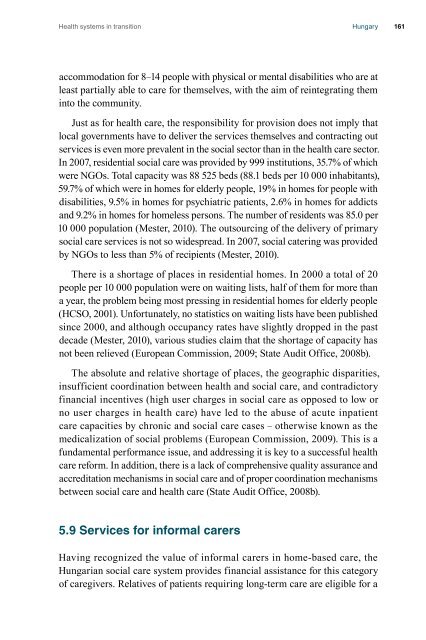Health Systems in Transition - Hungary - World Health Organization ...
Health Systems in Transition - Hungary - World Health Organization ...
Health Systems in Transition - Hungary - World Health Organization ...
Create successful ePaper yourself
Turn your PDF publications into a flip-book with our unique Google optimized e-Paper software.
<strong>Health</strong> systems <strong>in</strong> transition <strong>Hungary</strong> 161<br />
accommodation for 8–14 people with physical or mental disabilities who are at<br />
least partially able to care for themselves, with the aim of re<strong>in</strong>tegrat<strong>in</strong>g them<br />
<strong>in</strong>to the community.<br />
Just as for health care, the responsibility for provision does not imply that<br />
local governments have to deliver the services themselves and contract<strong>in</strong>g out<br />
services is even more prevalent <strong>in</strong> the social sector than <strong>in</strong> the health care sector.<br />
In 2007, residential social care was provided by 999 <strong>in</strong>stitutions, 35.7% of which<br />
were NGOs. Total capacity was 88 525 beds (88.1 beds per 10 000 <strong>in</strong>habitants),<br />
59.7% of which were <strong>in</strong> homes for elderly people, 19% <strong>in</strong> homes for people with<br />
disabilities, 9.5% <strong>in</strong> homes for psychiatric patients, 2.6% <strong>in</strong> homes for addicts<br />
and 9.2% <strong>in</strong> homes for homeless persons. The number of residents was 85.0 per<br />
10 000 population (Mester, 2010). The outsourc<strong>in</strong>g of the delivery of primary<br />
social care services is not so widespread. In 2007, social cater<strong>in</strong>g was provided<br />
by NGOs to less than 5% of recipients (Mester, 2010).<br />
There is a shortage of places <strong>in</strong> residential homes. In 2000 a total of 20<br />
people per 10 000 population were on wait<strong>in</strong>g lists, half of them for more than<br />
a year, the problem be<strong>in</strong>g most press<strong>in</strong>g <strong>in</strong> residential homes for elderly people<br />
(HCSO, 2001). Unfortunately, no statistics on wait<strong>in</strong>g lists have been published<br />
s<strong>in</strong>ce 2000, and although occupancy rates have slightly dropped <strong>in</strong> the past<br />
decade (Mester, 2010), various studies claim that the shortage of capacity has<br />
not been relieved (European Commission, 2009; State Audit Office, 2008b).<br />
The absolute and relative shortage of places, the geographic disparities,<br />
<strong>in</strong>sufficient coord<strong>in</strong>ation between health and social care, and contradictory<br />
f<strong>in</strong>ancial <strong>in</strong>centives (high user charges <strong>in</strong> social care as opposed to low or<br />
no user charges <strong>in</strong> health care) have led to the abuse of acute <strong>in</strong>patient<br />
care capacities by chronic and social care cases – otherwise known as the<br />
medicalization of social problems (European Commission, 2009). This is a<br />
fundamental performance issue, and address<strong>in</strong>g it is key to a successful health<br />
care reform. In addition, there is a lack of comprehensive quality assurance and<br />
accreditation mechanisms <strong>in</strong> social care and of proper coord<strong>in</strong>ation mechanisms<br />
between social care and health care (State Audit Office, 2008b).<br />
5.9 Services for <strong>in</strong>formal carers<br />
Hav<strong>in</strong>g recognized the value of <strong>in</strong>formal carers <strong>in</strong> home-based care, the<br />
Hungarian social care system provides f<strong>in</strong>ancial assistance for this category<br />
of caregivers. Relatives of patients requir<strong>in</strong>g long-term care are eligible for a
















